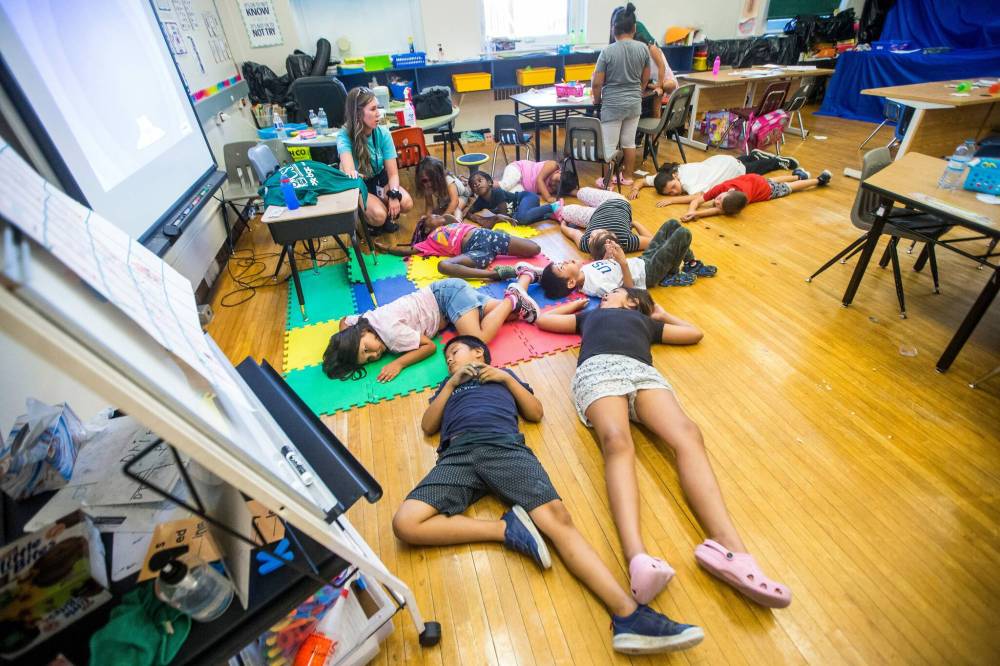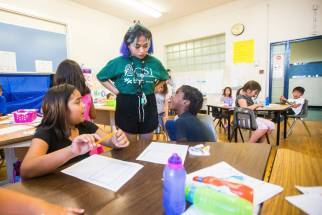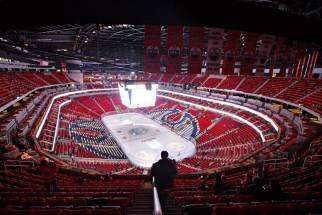Back to the basics for ‘COVID kids’ Learning how to be sociable, share, work in groups on agenda at summer school
Read this article for free:
or
Already have an account? Log in here »
To continue reading, please subscribe:
Monthly Digital Subscription
$0 for the first 4 weeks*
- Enjoy unlimited reading on winnipegfreepress.com
- Read the E-Edition, our digital replica newspaper
- Access News Break, our award-winning app
- Play interactive puzzles
*No charge for 4 weeks then price increases to the regular rate of $19.00 plus GST every four weeks. Offer available to new and qualified returning subscribers only. Cancel any time.
Monthly Digital Subscription
$4.75/week*
- Enjoy unlimited reading on winnipegfreepress.com
- Read the E-Edition, our digital replica newspaper
- Access News Break, our award-winning app
- Play interactive puzzles
*Billed as $19 plus GST every four weeks. Cancel any time.
To continue reading, please subscribe:
Add Free Press access to your Brandon Sun subscription for only an additional
$1 for the first 4 weeks*
*Your next subscription payment will increase by $1.00 and you will be charged $16.99 plus GST for four weeks. After four weeks, your payment will increase to $23.99 plus GST every four weeks.
Read unlimited articles for free today:
or
Already have an account? Log in here »
Hey there, time traveller!
This article was published 25/07/2022 (1235 days ago), so information in it may no longer be current.
“Sharing is caring” — a lesson many young children are grappling with because their introduction to school involved physical distancing, masking and an emphasis on independent study — is a fundamental principle in Justine Baxa’s classroom this summer.
Baxa, 19, said her goal as an instructor at Community School Investigators, better known as CSI, is to introduce her campers to as much group work as possible throughout their vacation.
“They are ‘COVID kids,’” she said, noting the majority of her students will start Grade 1, 2 or 3 at Shaughnessy Park School after Labour Day. “They don’t know how to talk to each other. They want to grab. They want to do (activities) by themselves.”
“They are ‘COVID kids… They don’t know how to talk to each other. They want to grab. They want to do (activities) by themselves.” – Justine Baxa
Disruptions to in-person instruction, and in turn, academic and social-emotional education, have brought discussions about “learning loss” into the mainstream since March 2020.
Long before the phenomenon became a pandemic buzz-phrase, Winnipeg educators were concerned about an annual summer slide in knowledge.
The CSI initiative, now run by the Boys and Girls Clubs of Winnipeg, was born in 2005 to ensure K-6 students from low-income households could access educational experiences year-round. The free program, primarily funded via the province, United Way and Winnipeg School Division, combines rote instruction with fun camp activities that take place over a five-week period.
The organizers are marking a return to typical operations this summer, after COVID-19 challenges paused field trips — a highlight for many participants — and reduced the number of camp spots available in 2020 and 2021. There are upwards of 700 children enrolled across 12 CSI sites, which serve 14 elementary communities in WSD, in 2022.
MIKAELA MACKENZIE / WINNIPEG FREE PRESS Instructor Justine Baxa helps kids at CSI (Community School Investigators) summer learning loss camp for inner-city kids at Shaughnessy Park School in Winnipeg.
“COVID has really held up a magnifying lens and made us realize the potential for learning loss,” said Kate Cove, who oversees CSI as manager of education programs at the Boys and Girls Clubs of Winnipeg.
“Kids are resilient, but I don’t necessarily think we should expect them to be resilient. Offering them those opportunities to at least maintain what they’ve learned (during the school year) seems incredibly important, more so now than before,” Cove added.
Following a “walking school bus” in the morning, young learners at the Shaughnessy Park site participate in various literacy and numeracy activities between 9 a.m. to 3 p.m., as well as crafts, science experiments and outdoor adventures. Learners are served healthy breakfasts and lunches every day so they are ready for any activity, be it a reading circle, gardening session or trip to the splash pad.
Research shows that Canadian students who do not actively engage in education throughout the summer can lose the equivalent of one month’s worth of school-year instruction from a previous academic year, if not more.
MIKAELA MACKENZIE / WINNIPEG FREE PRESS Ana Ally picks a pose for a relaxation exercise.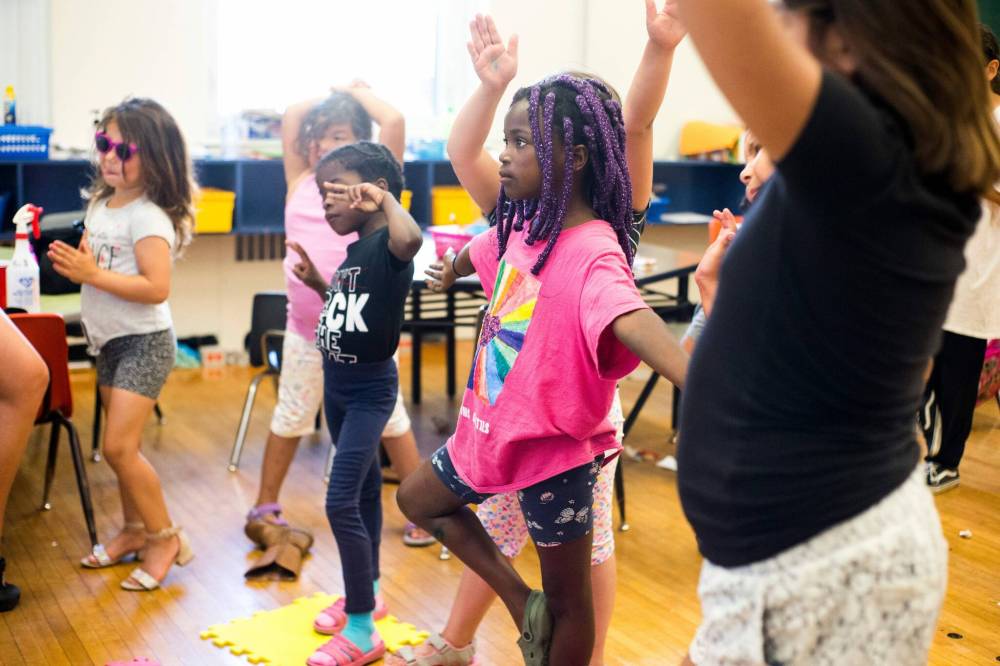
Since the pandemic began, more than 110 school days — approximately 20 per cent of the in-person instructional days scheduled between September 2019 and June 2022 — have been remote in Winnipeg-area divisions. Parent supervision, internet quality, and device access are among the factors that influenced both the quantity and quality of virtual learning during that period.
“There is no common bar or standard that I feel like we can hold any of the kids to. Whether that bar or standard existed in the first place is a different conversation, but it’s exacerbated with COVID. We can’t just create a lesson plan and have it just be a static entity anymore,” Cove said.
The CSI manager said training for staff, primarily post-secondary education students who work alongside certified teachers, included discussions about adjusting lessons for students who are below, at and above grade level.
“There is no common bar or standard that I feel like we can hold any of the kids to. Whether that bar or standard existed in the first place is a different conversation, but it’s exacerbated with COVID.” – Kate Cove
Before the final bell rang for summer break, CSI instructors met with classroom teachers at their home school to learn about the needs of particular students and find out what foundational skills working educators suggest they should focus on throughout the program.
Baxa, an education student at the University of Winnipeg, said she has been facilitating group projects for her students at the request of teachers at Shaughnessy Park, who witnessed the young learners struggle with collaboration in 2021-22.
On a recent midsummer morning, Baxa’s young students were fiddling with 2B pencils as they completed a writing assignment at their desks. Many of their tiny palms were stained with purple and blue dye — remnants of a group slime-making activity from earlier in the week.
MIKAELA MACKENZIE / WINNIPEG FREE PRESS A group plays a “the floor is lava” game.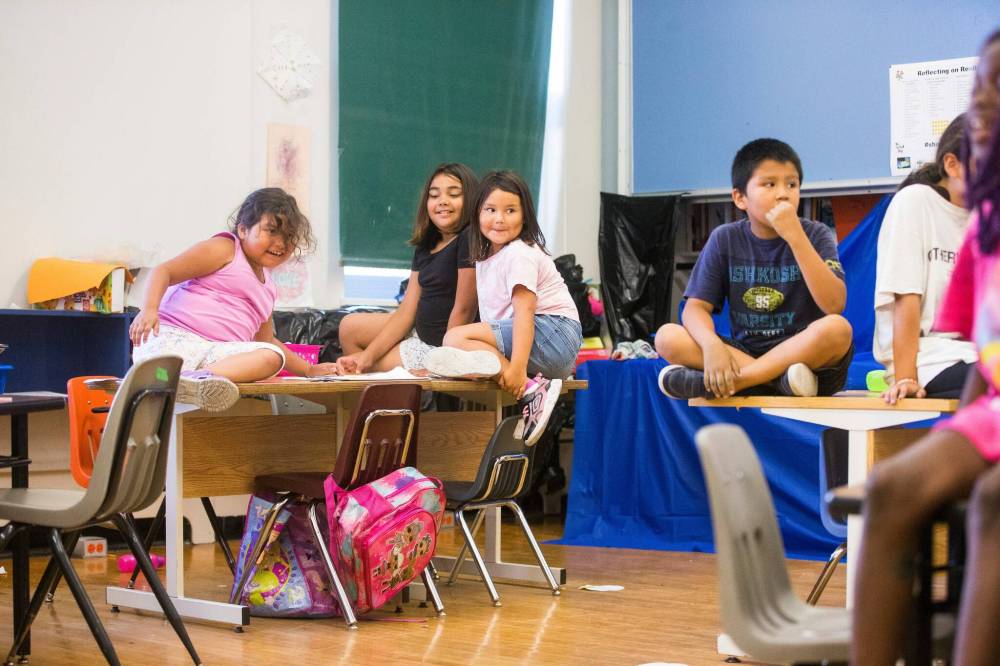
The students have a strong foundation in counting and other basic math skills, but the instructor, who is spending her summer working with the youngest learners at CSI for the fourth year in a row, has noticed challenges with their writing skills, focusing abilities, and overall school readiness.
“They need to learn that we don’t talk if our hands are not raised… Preparing them for school is really important, and just having fun while learning,” she said.
The overwhelming majority of her class of 19 is present daily, Baxa said, adding strong attendance is proof to her that the 2022 session has been a success to date.
maggie.macintosh@freepress.mb.ca
Twitter: @macintoshmaggie

Maggie Macintosh reports on education for the Winnipeg Free Press. Funding for the Free Press education reporter comes from the Government of Canada through the Local Journalism Initiative.
Our newsroom depends on a growing audience of readers to power our journalism. If you are not a paid reader, please consider becoming a subscriber.
Our newsroom depends on its audience of readers to power our journalism. Thank you for your support.

